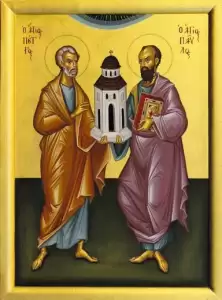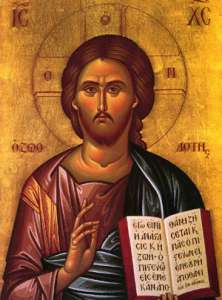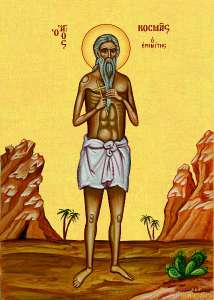Warning: Undefined array key "margin_above" in /home/stscahvallejo/public_html/wp-content/plugins/ultimate-social-media-icons/libs/controllers/sfsiocns_OnPosts.php on line 652
Warning: Undefined array key "margin_below" in /home/stscahvallejo/public_html/wp-content/plugins/ultimate-social-media-icons/libs/controllers/sfsiocns_OnPosts.php on line 653

Weekly catechism and spiritual devotion for the Orthodox home
Throw your weakness before God and the Lord will become your strength. -St. Moses the Strong
The Secret School
September, 2022
For Sunday, September 4
The image above is a famous painting by Greek artist Nikolaos Gyzis called "Krifo Scholio" or "Secret School." It was painted in 1885 and it depicts a scene of a time when Greece was under Ottoman Muslim rule (from the 15th - 19th century). Historians state that during these difficult centuries of occupation, the Orthodox Church provided the only means of preserving and teaching Christian doctrine and the Greek language through secret gatherings in monasteries and homes of the faithful.
I chose this famous painting, and what it represents, as a kind of emblem for the mission of SOFIA, our weekly catechism and spiritual devotion for the Orthodox home. While we are not under occupation, the pervasive secularism in our society has shaped our lives in such a way that our parish, our monasteries and our homes are the only places where Christian doctrine can be taught and learned. Orthodox Christian parents are also under pressure to protect their children from unnatural and demonic ideas about gender and sexuality being constantly taught in schools, the media, and popular culture which are contrary to God's law and the teachings of our Holy Orthodox Faith.
So we must be careful not to be deceived by the spirit of antichrist which lurks behind anything and anyone that teaches or promotes those things that are contrary to God's law. St. John the Apostle and Evangelist tells us, "Do not love the world or anything in the world. If anyone loves the world, the love of the Father is not in him. For all that is in the world—the desires of the flesh, the desires of the eyes, and the pride of life—is not from the Father but from the world. The world is passing away, along with its desires; but whoever does the will of God remains forever. (1 John 2:15-17).
Contrary to what secular culture is telling us, we are more than animals whose only purpose in life is to eat, drink, acquire possessions, experience pleasure, pain and die. The constant promotion of a solely carnal lifestyle has the power to deceive us and blind us from seeing the glorious and divine image of God that is within us and within others, thereby derailing us from the spiritual work of seeking the true purpose of life: reclaiming our glorious identity as children of God through a life in Christ.
So we must resist and be ready to struggle, knowing that God is with us and He loves those who seek after righteousness and holiness. "A fish that is alive swims against the flow of water. One that is dead floats down with the water. A true Christian goes against the current of sinful age. A false one is swept away by its swiftness,” as St. Philaret of Moscow said.
The true "secret school" is in the human heart. This is where the Holy Spirit teaches us and transfigures us into Christians; but only if we repent and humble ourselves and give our hearts to God and follow the great commandment to "love the Lord your God with all your heart and with all your soul and with all your mind...and your neighbor as yourself" (Matthew 22:37). So let us love and cling to Christ and not be deceived by the spirit of antichrist in this age. Let us only desire His saving love and teach our children to love Christ and all people by our own example. But let us also understand that there cannot be true love where there is no love for truth.
The Orthodox Church and the Christian home is the last refuge for learning and experiencing God's truth about who we really are and what the purpose of life really is.
Fr. Ninos
 Epistle Reading
Epistle Reading
Sing praises to our God, sing praises.
Verse: Clap your hands, all you nations.
The reading is from St. Paul's First Letter to the Corinthians 15:1-11
Brethren, I would remind you in what terms I preached to you the gospel, which you received, in which you stand, by which you are saved, if you hold it fast -- unless you believed in vain. For I delivered to you as of first importance what I also received, that Christ died for our sins in accordance with the scriptures, that he was buried, that he was raised on the third day in accordance with the scriptures, and that he appeared to Cephas, then to the twelve. Then he appeared to more than five hundred brethren at one time, most of whom are still alive, though some have fallen asleep. Then he appeared to James, then to all the apostles. Last of all, as to one untimely born, he appeared also to me. For I am the least of the apostles, unfit to be called an apostle, because I persecuted the church of God. But by the grace of God I am what I am, and his grace toward me was not in vain. On the contrary, I worked harder than any of them, though it was not I, but the grace of God which is with me. Whether then it was I or they, so we preach and so you believed.
St. Paul is writing this letter to the church in Corinth, Greece. The church in Corinth was struggling with various disagreements and erroneous beliefs that has caused much strife and division. There were also problems of immoral behavior and ignorance about the sacred purpose of Christian marriage and many other pastoral issues. They needed to be reminded of how they once walked in darkness in their former lives and who they had now become after receiving Paul's preaching and believing in Jesus Christ and the good news of his resurrection from the dead and the gift of salvation and eternal life through Christ.
In this coming Sunday's epistle reading above, St. Paul is closing his letter by reminding the faithful in Corinth about the teaching he gave them: that it came not from himself but from Jesus Christ. He reminds them about the resurrection of Jesus Christ and that it actually did happen as many eyewitnesses said. St. Paul also mentions the power of God's grace and how it was at work in him to bring about his own conversion from being a persecutor of Christians to a great leader of the Christians.
Questions:
- Why do you think St. Paul has to remind the people who were Christians about what they are supposed to believe?
- Did you notice any sentences in the epistle that remind you of the Creed that we recite in the liturgy?
- Can you remember a time when God's grace intervened in your life and rescued you from physical or spiritual danger?
 Gospel Reading
Gospel Reading
12th Sunday of Matthew
The Gospel According to Matthew 19:16-26
At that time, a young man came up to Jesus, kneeling and saying, "Good Teacher, what good deed must I do, to have eternal life?" And he said to him, "Why do you call me good? One there is who is good. If you would enter life, keep the commandments." He said to him, "Which?" And Jesus said, "You shall not kill, You shall not commit adultery, You shall not steal, You shall not bear false witness, Honor your father and mother, and You shall love your neighbor as yourself." The young man said to him, "All these I have observed; what do I still lack?" Jesus said to him, "If you would be perfect, go, sell what you possess and give to the poor, and you will have treasure in heaven; and come, follow me." When the young man heard this he went away sorrowful; for he had great possessions.
And Jesus said to his disciples, "Truly, I say to you, it will be hard for a rich man to enter the kingdom of heaven. Again I tell you, it is easier for a camel to go through the eye of a needle than for a rich man to enter the kingdom of God." When the disciples heard this they were greatly astonished, saying, "Who then can be saved?" But Jesus looked at them and said to them, "With men this is impossible, but with God all things are possible."
In this gospel reading, we hear from Christ how important it is to follow the 10 Commandments that God gave to Moses. The purpose of the 10 Commandments is ultimately to lead us to holiness and greater love and devotion to God. Yet there is the danger of following the commandments only with our minds in a purely mechanical way while giving our heart or loving something or someone more than Him. In this way, we dishonor our personal relationship with God.
The young man was seeking eternal life. The Lord revealed to him what eternal life would cost him. It would cost him his heart and his love. But because his heart loved his possessions so much, he was unable to love God.
Questions:
- What does God require of those who desire eternal life?
- Is money evil?
- Is it impossible to be saved and go to heaven if you are rich?
- In the end, did his possessions bring the young man joy or sorrow?
![]() The Great Doxology
The Great Doxology
Just before the Divine Liturgy begins, we sing the Great Doxology. The word doxology refers to a short verse or hymn praising God. The word comes from the Greek doxa, meaning glory, and logos, meaning word or speaking. A doxology can be sung as a hymn and also spoken by the priest at the end of prayers. For example. after we pray the "Our Father" the priest says this doxology: "For thine is the Kingdom and the Power and the Glory, now and forever and unto ages of ages. Amen." The words "Glory to the Father and the Son and the Holy Spirit" are also a doxology. Doxologies also appear in the Holy Bible. In Romans 16:27, St. Paul ends his teaching with the words "to God, alone wise, be glory through Jesus Christ forever. Amen." In St. Paul's Letter to the Ephesians, he ends a sentence with the words "to him be glory in the church and in Christ Jesus throughout all generations, forever and ever. Amen." (Ephesians 3:21). Doxologies are a beautiful expression of praise, glory and love for the Holy Trinity.
Below are recordings of the hymns of the Divine Liturgy as sung on Sundays at our parish. Thank you to Aurelia Prose for her beautiful singing. Every week we will focus on one of the hymns to understand its meaning in the service.
This week, let's look at what we just discussed above: the meaning of doxology. Every Sunday, we sing a hymn called the Great Doxology right before the Divine Liturgy starts. If you arrive to church early, you'll hear it!
Let's listen to the hymn and try to learn it.
- Click the button below to download the sheet music.
- View or print out the sheet music.
- Click Track 1 - Great Doxology below to listen to it chanted. Try to learn it and sing-along!
 Venerable Kosmas the Hermit and Confessor
Venerable Kosmas the Hermit and Confessor
Kosmas was from Crete in the second half of the sixth century, where he received a good education. He opposed the heresy of the Monothelites, who believed that Christ had only one nature and and not two, fully human and fully divine. At first, Kosmas lived in a monastery. He was forced to leave and become a hermit in the wilderness because of his opposition to the Monothelite bishops. Alone with God, he fought against the demonic powers with supernatural fasting and ascetic feats. Kosmas lived barefoot and naked, covered only by his body hair. When he died in this isolation, he remained unburied in his cave until later discovered. His relic was incorrupt. He was taken to a more accessible large church, but when a major drought struck the region and the fruit trees and grains were destroyed, the people prayed to God. It was then that Kosmas appeared to someone and adamantly told him to remove the jewelry from his relic and return him to his cave. When the people returned it, the rain fell for days. About 400 years later, some Venetian merchants stole the incorrupt and fragrant relic and placed it in the St. George Maggiore Church in the chapel of St. Benedict in Venice, Italy, where it remains to this day. (Source: Orthodox Calendar Company)
We commemorate the Venerable Kosmas the Hermit and Confessor on September 2. Through the intercession of St. Kosmas, Lord Jesus Christ our God have mercy on us and save us. Amen.
God created us and gave us a distinct human nature. No other creature is like us. God's nature is divine and uncreated. No one is like God either. When God entered into the world that he had created and was born as the man Jesus, he was also completely unique. No one is like Jesus Christ. Because Jesus is God in human flesh, he has both a divine and a human nature. Since each nature must also therefore have its own distinct will, Christ had both a divine and a human will.
This is very important. Because if Jesus was only God then he could not be joined to us. If he was only man, then he could not save us. But because he is both God and Man, he can do both. And he willed to save us both as God, by desiring to save humanity, and as man by being willing to be crucified for us.
St. Kosmas opposed the heresy of the Monothelites who taught that Christ had only one will.
Thank you for participating in SOFIA! Look for an email notification next week when a new lesson page is posted. See you Sunday!
